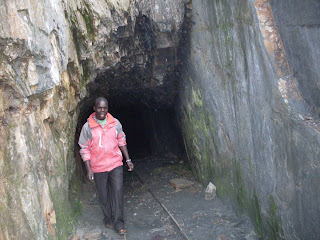Ghana minister advises Africa to use oil revenue to transform society
By Stephen Nuwagira in Accra, Ghana
The rise in oil and mineral prices and the expansion of new discoveries in recent times present an unparalleled opportunity for Africa’s resource-rich economies to transform themselves.
Dr. Joe Oteng–Adjei, the Ghanaian energy minister, said it was sad that Africa’s resource-rich economies were the least diversified, with weak growth, higher rates of poverty and inequality than non-mineral dependent economies at similar levels of income.
“The extraction of gold, diamond, bauxite, manganese and oil has over the years has made very little impact on the transformation of the economies in Africa. Most of the affected communities are plagued with issues of environmental degradation, unemployment, poverty and other social vices. One wonders whether the continuous extraction of such minerals have any meaning to them,” Oteng-Adjei noted.
He added that while some countries like South Africa, Botswana, Chile, Malaysia and Indonesia have succeeded in harnessing natural resources for sustained increases in income, most resource-rich African countries had very little to show.
He added that many African countries, including Ghana, were also facing challenges with regards to the exploitation of natural resources and use of the money earned.
“These resources will run out. Therefore, the depletion of our natural assets needs to be offset with the accumulation of other assets and improvement of other sectors,” he advised.
This was in a speech read by Solomon Asoalla, the director of finance and administration in the energy ministry, during the just-concluded Summer School of the Regional Extractives Industry Knowledge Hub. The two-week training on oil, gas and mining at the Ghana Institute of Management and Public Administration in Accra was conduct under the theme; “Governance in oil, gas and mining revenue”.
Oteng-Adjei pointed out that sustainable development in oil-rich nations depended on the rents from resource extraction being converted into other sources of income.
“It is in the light of this that the government of Ghana at the onset of Jubilee oil production put in place the Petroleum Revenue Management Act of 2011 to provide the framework for the collection, allocation and management of petroleum revenue in a responsible, transparent, accountable and sustainable manner for the benefit of the citizens,” he said.
This year’s Summer School was attended by 45 senior editors and civil society leaders from Uganda, Senegal, Ghana, Kenya, South Africa, Tanzania, Malawi, South Sudan, Nigeria, Zambia and Sierra Leone.
Oteng-Adjei said Ghana has signed on to the Extractive Industries Transparency Initiative (EITI) to strengthen transparency and accountability in relation to revenue and payments from operators in the extractive sector.
“To consolidate the gains so far made in the natural resource governance, we have drafted an EITI Bill to provide the legal framework and, ultimately, to enhance transparency and accountability in relation to payments originating from the natural resources sector of the and receipts by Government.”
Albert Kan-Daapar, the chairman of the parliamentary accounts committee, said the lack of good financial governance has resulted in massive corruption by individuals in public service.
“Accountability mechanisms in our public sector financial management systems are flouted upon and disregarded, creating substantial opportunities for politicians and public servants to steal. Unless we can put an end to this disregard of key accountability mechanisms, we will continue to swim in poverty in spite of the significant revenues from our natural resources,” he said.
This, he added, calls for more vigilance by civil society organisations and the media as protectors of national integrity and the will of the people. “This is the most important safeguard of our national wealth and must be promoted.”


